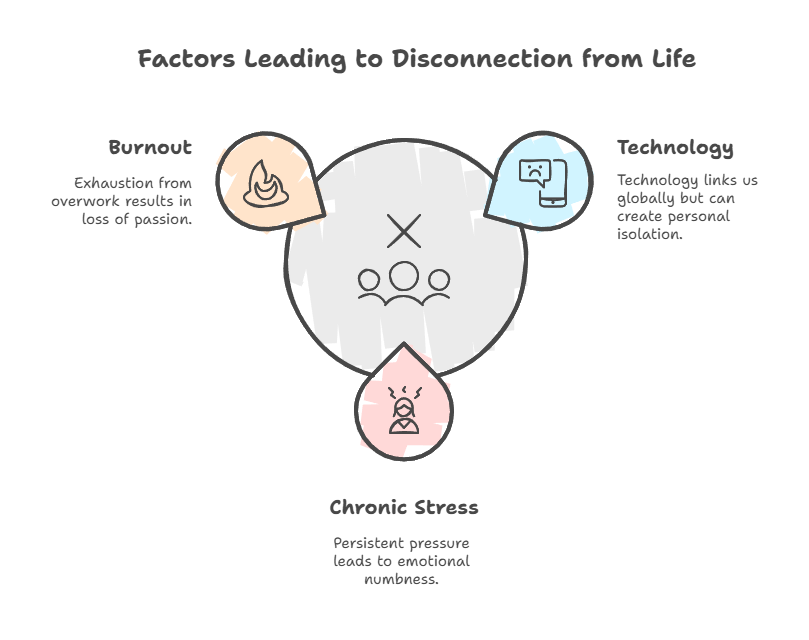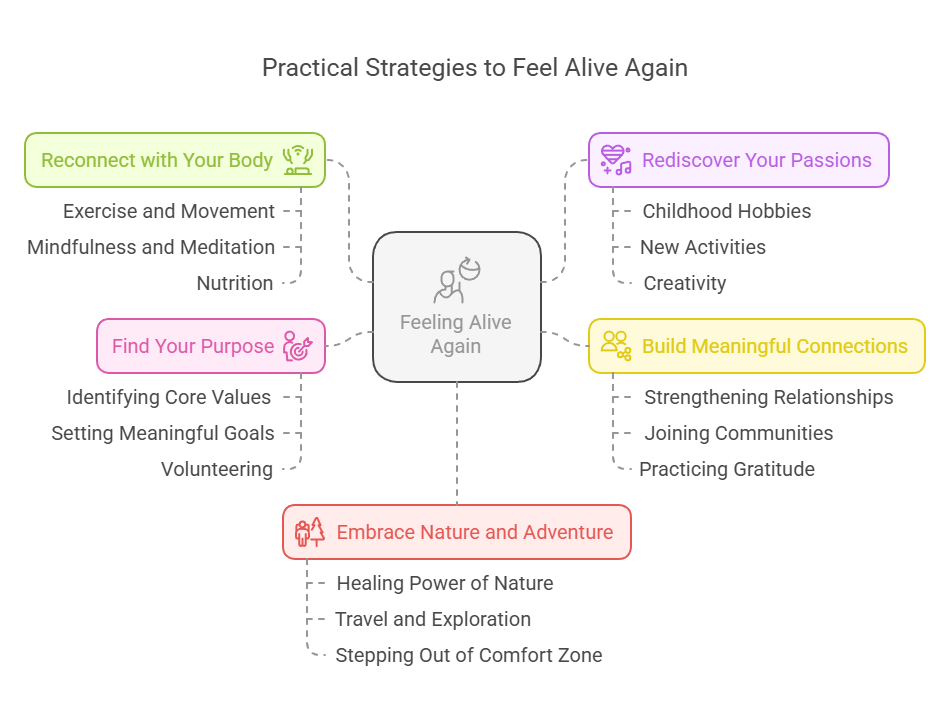Do you ever feel like you’re moving in a robotic way and you no longer take pleasure in your life and asking how to feel alive again?
In today’s world, which is a convoluted, propitious, and digital one; it is rather easy to fall into depression where we feel like zombies walking around our lives yet feeling nothing, but at the same time, feeling everything.
Although the situation that you feel overwhelmed is disappointing, however, the good news is you are not alone, and there are rational and actionable things that you can do to regain your passion and feel alive again.
This article will accompany you in the process of understanding why you might feel disconnected, exploring the root causes, and sharing proven strategies to help you be connected to your passion, purpose, and joy.
There are various methods and this includes reconnecting with your body as well as trying out new activities which will teach you how to be free from the monotonous thoughts of your existence and adopt the lifestyle of openness.
Let’s dive in and explore how you can start feeling alive again today.
Why Do We Feel Disconnected from Life?
In the modern era, the daily frenzy and constant connection bring about a basic void or disconnection in the lives of many.
The disconnectedness we often feel may mean that we move around like robots with no emotions, as a result of which, because life is not the same without joy, spiritual pleasure, and a sense of meaning, we may end up feeling unfulfilled.
This section delves into the causes of this timeless struggle but why being alive is a must, and then the article will tell you about the steps to regaining your agelessness.
The Modern Struggle: Numbness and Burnout
The challenges of keeping up with today are severe that we are not able to get rid of the feeling of exhausing.
We are very likely to be tired and emotions are likely to leave us after the end of work load, under performance in the social obligations, and the technology was the only stress that has never stopped.
- The Role of Technology: Even though technology links us from all over the world, it can also separate us from our selves and even from those who are nearby. To illustrate, browsing through social media platforms generally results in people feeling envious and discontented instead of enabling them to establish authentic connections.
- Chronic Stress: Persistent pressure to reach the standards is one of the potential reasons responsible for chronic stress. It is often the side effect of decreased emotional clarity that is accompanied by the overbearing nature of stress, thus making one’s sensitivity be decreased. As a result, stressing over something that doesn’t matter or is not worth while may cost the time of one’s life. But the
- Burnout: Burnout, a state of mental, emotional, and physical exhaustion, is usually arrived at from constant stress and overwork. It has us be loveless and unenthusiastic about the things we once used to adore and live for.
This modern fight is more than a personal one it is a social one also.
It is specified in the research that rates of burnout and psychological problems such as anxiety and depression are increasing, so the importance of finding solutions for people to reconnect with life is emphasized.
The Importance of Feeling Alive
To be alive is much more than happy in of itself—the most important factor of health and well-being. On feeling alive to some extent, we undergo:
- Joy and Fulfillment: Life feels meaningful and rewarding.
- Resilience: We’re better equipped to handle challenges and setbacks.
- Connection: We feel more connected to ourselves, others, and the world around us.
Life is a dead-end road if it doesn’t have that touch of aliveness, and it will become unbearable. It’s not just about surviving—it’s about thriving.
Living life to the fullest is the way we interact with the world, go after our dreams, and form connections that matter.
How to Feel Alive Again: Practical Strategies
You can give life a shot without having to go to any trouble with it or see it as a remote impulse.
Your pleasure, self-discovery, and delight in life will be set afire again if you take clear, feasible actions.
This section offers effective tips to recover your personal sense of sentience, separated into five main components: finding yourself in your body, re-using the things you love, forming strong ties, defining your purpose, and also thriving the outdoors as well as being on an adventure.
Reconnect with Your Body
Your body is the vessel that makes you feel, and to feel alive once more, reconnecting with it is a powerful way.
By nurturing your physical health, you are actually building a solid base for emotional and mental balance.
Exercise and Movement
Participation in physical activities is control mark as one of the best methods you can use to heighten your mood and energy levels.
When exercising, the brain releases endorphins, the body’s natural “feel-good” chemicals, and they are capable of weapons to the feelings of numbness and worn-outness.
- Examples: Try activities like yoga, dancing, hiking, or even a brisk walk in the park.
- Case Study: A 2020 study published in The Lancet found that regular exercise significantly reduces symptoms of depression and anxiety, highlighting its role in improving mental well-being.
- Tip: Start small—even 10 minutes of movement a day can make a difference.
Mindfulness and Meditation
By doing meditation, in particular, you can reduce stress and increase self-awareness. You can stay present and really engage with the moment, which is necessary for being happy.
- Example: Try a guided meditation app like Headspace or Calm to get started.
- Benefit: Research shows that mindfulness can improve emotional regulation and increase feelings of happiness.
- Tip: Incorporate mindfulness into daily activities, like eating or walking, to make it a habit.
The Role of Nutrition
What you consume can directly change your mood.
A healthy and nutritionally well-balanced diet that is abundant in whole grains can improve your mental health and alleviate the problem with appetite.
Rediscover Your Passions
Passions and hobbies are known for bringing joy and excitement to life.
Rediscovering what fires one up will make you feel alive again.
Revisiting Childhood Hobbies
Think about the things you enjoyed the most during your early years—whether it was painting, playing an instrument, or building things.
To immerse oneself in these activities again could encourage the feeling of amazement and innovation in you.
For instance: If you used to love sketching in your early days, go and grab a drawing pad to start with.
Advantage: The activities we were involved in as kids are often a conduit to a time when life appears to be more straightforward and jolly.
Trying New Activities
Stepping out of your comfort zone and trying something new can spark excitement and curiosity.
- Examples: Take a cooking class, learn a new language, or try a sport you’ve never played before.
- Tip: Join local groups or online communities to find inspiration and support.
The Power of Creativity
Engaging in creative activities can help you express yourself and tap into your inner vitality.
- Examples: Write a poem, start a journal, or try DIY projects.
- Benefit: Creativity has been shown to reduce stress and increase feelings of accomplishment.
Build Meaningful Connections
Human connection is a fundamental part of feeling alive.
Strengthening relationships and building new ones can bring joy and purpose to your life.
Strengthening Relationships
Invest time in nurturing your relationships with family and friends.
- Example: Schedule regular catch-ups or plan activities together.
- Tip: Practice active listening to deepen your connections.
Joining Communities
Being part of a community can provide a sense of belonging and support.
- Examples: Join a book club, volunteer group, or fitness class.
- Benefit: Studies show that social connections improve mental health and longevity.
Practicing Gratitude
Gratitude shifts your focus to the positive aspects of life, helping you feel more connected and fulfilled.
- Example: Keep a gratitude journal and write down three things you’re thankful for each day.
- Tip: Express gratitude to others—it strengthens relationships and boosts your mood.
Find Your Purpose
Having a sense of purpose gives life meaning and direction, which is essential for feeling alive.
Identifying Your Core Values
Reflect on what truly matters to you. Your core values can guide your decisions and actions.
- Example: If kindness is a core value, look for ways to be kind in your daily life.
- Tip: Use tools like value assessment worksheets to clarify your priorities.
Setting Meaningful Goals
Goals give you something to strive for and create a sense of accomplishment.
- Example: Set a goal to learn a new skill or complete a project.
- Tip: Break larger goals into smaller, manageable steps.
Volunteering and Giving Back
Helping others can provide a deep sense of fulfillment and purpose.
- Example: Volunteer at a local shelter or mentor someone in your field.
- Benefit: Research shows that volunteering improves mental health and life satisfaction.
Embrace Nature and Adventure
Nature and adventure have a unique ability to rejuvenate the spirit and help you feel alive.
The Healing Power of Nature
Spending time in nature reduces stress and increases feelings of well-being.
- Example: Go for a hike, visit a beach, or simply sit in a park.
- Fact: A study in Scientific Reports found that spending at least two hours a week in nature significantly improves mental health.
Travel and Exploration
Traveling exposes you to new experiences and perspectives, reigniting your sense of wonder.
- Example: Plan a weekend getaway or explore a new neighborhood in your city.
- Tip: Even small adventures can make a big difference.
Stepping Out of Your Comfort Zone
Trying something adventurous, like skydiving or public speaking, can boost your confidence and energy.
- Example: Take a solo trip or try an extreme sport.
- Benefit: Stepping out of your comfort zone helps you grow and feel more alive.
This section presents a detailed guide for not feeling dead, with practical actions and examples.
It is also provides the reader with the information which will help them to practically apply the tools they have read about.
The content may cover the aspect of the topic and therefore it will be a consistent composition.
Conclusion
Being alive is a process and not an event. A person can get joy and passion from various activities, such as being aware of the causes of the disconnection process and using different strategies to solve it.
Get started with small steps—spend time in nature or with a friend you have not seen in a long time, or even learn to do something you have always wanted to do.
It does not matter how old you are, you always have the opportunity to live life to the fullest. Take the first step and let yourself take that journey toward feeling alive.
FAQs
- How long does it take to feel alive again?
It varies, but small changes can make a difference in weeks. - Can small changes really make a difference?
Absolutely! Small, consistent actions build momentum. - What if I don’t know what my passions are?
Start by exploring new activities and reflecting on what brings you joy. - How do I stay motivated?
Set small, achievable goals and celebrate progress. - Is it normal to feel disconnected sometimes?
Yes, but it’s important to address it before it becomes chronic.





Pingback: How Do I Stop Being Passive Aggressive?
Pingback: How to Build Confidence: 7 Simple Strategies to Boost Your Self-Esteem